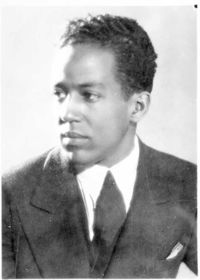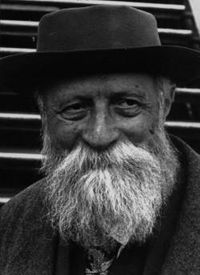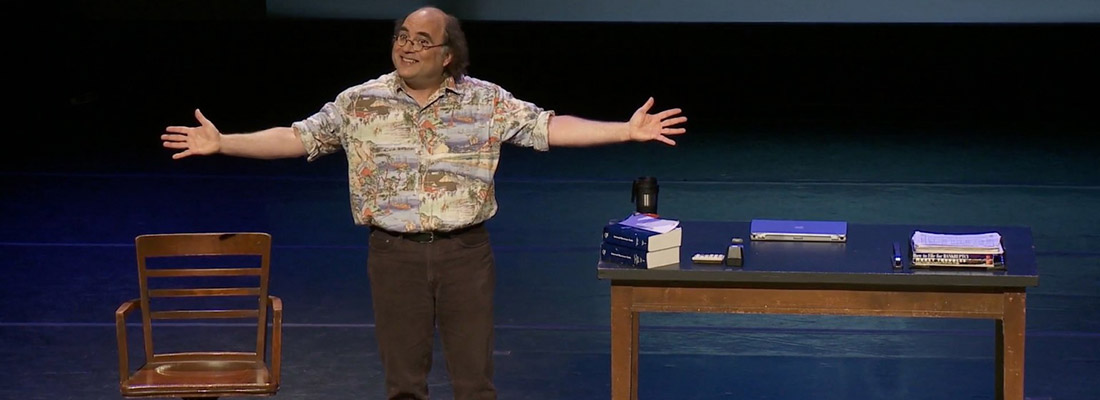 I’m sitting at a terrific, progressive-minded bookstore/restaurant/café in Washington D.C. called Busboys and Poets. It was just rainstorming outside — typhoonishly — and it was so cool, and comforting, sitting inside this lovely place (which is named in honor of the great writer Langston Hughes, who once worked as a busboy in town) and watching the torrential downpour through the huge windows. They’ve created a wonderful community here, at the confluence of several neighborhoods, and the clientele are a chatting/sipping/Internetting mixture, racially and (from what I can tell) economically. Jazz is playing on the sound system; I’ll be staying with my friends David and Denice; life, for the moment, feels as good as it can feel, given that I’m desperately lonely for my wife (whose birthday this is!) and son.
I’m sitting at a terrific, progressive-minded bookstore/restaurant/café in Washington D.C. called Busboys and Poets. It was just rainstorming outside — typhoonishly — and it was so cool, and comforting, sitting inside this lovely place (which is named in honor of the great writer Langston Hughes, who once worked as a busboy in town) and watching the torrential downpour through the huge windows. They’ve created a wonderful community here, at the confluence of several neighborhoods, and the clientele are a chatting/sipping/Internetting mixture, racially and (from what I can tell) economically. Jazz is playing on the sound system; I’ll be staying with my friends David and Denice; life, for the moment, feels as good as it can feel, given that I’m desperately lonely for my wife (whose birthday this is!) and son.
It’s been a whirlwind of a last few days: I performed two pieces in San Diego — then, immediately after my second performance (on Thursday night) I rushed to the airport to take a red-eye flight to Washington-Dulles. When I got to my gate area, the food choice was McDonald’s. I hadn’t partaken of Mickey D’s in a long time, but — after eating only half a bag of cashews all day, to that point — I enthusiastically ordered a super-sized Big Mac dinner (with Diet!) and brought it on the plane. As soon as we reached altitude, I wolfed down the whole meal in like five minutes. And after that I felt very strange. I felt much as Dr. Bruce Banner must feel when he’s about to transform into the Incredible Hulk: toxic, unsettled, out of control. I honestly worried that I might explode. Maybe they use gamma rays when they cook that stuff. Never again. Till next time.
I made it, intact, to the storied Lincoln Theatre, where last night I did an excerpt from Citizen Josh at a gala event celebrating the Arena Stage‘s upcoming season. (I’ll be performing the piece at Arena this fall.) [Interstitial note: It’s storming again outside — very dramatic! And two young women next to me at this long table — law-school students, clearly — are quizzing each other regarding “third-party plaintiffs” and “third-party defendants”; I have the pleasant sensation of being an uninvolved fourth party.] There were lots of other performers on the program, and I got to do something that, incredibly, was a first for me in 20 years in the theater: I actually shared a dressing room! That’s never happened before! My friend, the genius comedienne Marga Gomez, has a joke that goes something like, “You know the worst thing about being a solo performer? The cast parties.” And there’s some truth in that. For once, I was in the middle of a community (that word again! [And coincidentally, David just joined me here and said, “Ah! You found the community table.”])! Actors teasing one another, telling jokes, comparing leads on day jobs, making sure that a young boy performing with them had his collar done just right — it was a joyful thing. At one point I apologized for being so bleary and slow-on-the-uptake, explaining that I hadn’t slept in a couple of days; an actor sitting next to me patted me on the back, saying, “You don’t have to apologize to us, Josh — you’re one of us!” Then he and I spent the next half-hour swapping proud stories about our respective sons. [David — who is David Dower, my theatrical director and collaborator — is now poring over the Citizen Josh script, looking for ways we can improve it for upcoming runs.]
One cool thing that came up during this trip was that I found someone who shared my interest in “I and Thou.” I was chatting with San Diego Rep Associate Artistic Director Todd Salovey, and he asked me what new theater stuff I was working on, and I told him I was focusing on two subjects, which may or may not end up in one piece: playing the oboe, and the “I-Thou Relationship.” He seemed unaffected by the oboe mention (many people cringe), but got all excited about the second topic. Turns out Todd is from a very prominent rabinnical family line, and he’s been really into theological explorations in recent times.
And [change of scenery here — I’m now at David and Denice’s: it’s even nicer!] theology is of the essence in this I/Thou stuff. “The I/Thou Relationship” was the title of a doctoral dissertation that a friend of my dad’s wrote at the Union Theological Seminary in New York. That friend, Chuck, a Presbyterian minister, passed away several years ago, and he left me his dissertation and supporting documents, in the hope that I would bring them to Union Theological and that they’d be put in the library there. With my typical alacrity, I haven’t done this yet: the documents currently sit in a storage unit in Richmond. But lately, especially, Chuck has been much on my mind; he was such a dear friend of ours, and such a big influence on me. And I feel as though if I can transport his stuff, as promised, and also even try to get a handle on “I/Thou,” I may be able to get a little closer to Chuck, even as his actuality recedes with time.
 I and Thou is the title of an influential book by Martin Buber (1878-1965), a Jewish philosopher. Based on my quick reading of Buber’s Wikipedia entry, he led a fascinating, passionate, exemplary life. In his philosophy (I read) Buber distinguished between two different kinds of relationships, which he called (respectively) “I-It” and “I-Thou.” From what I can make out (and from the sound of each phrase), “I-It” refers to more limited, materialistic attachments, while “I-Thou” enters the realm of the spiritual and (perhaps my incorrect addition here) political. But given my obsession with democracy, I find very suggestive the notion that Buber was looking at how we are all connected (whether we realize it or not). And in one telling sentence, the very well-written Wikipedia entry brings Buber right into my wheelhouse: “The generic motif Buber employs to describe the dual modes of being is one of dialogue (Ich-Du) and monologue (Ich-Es).”
I and Thou is the title of an influential book by Martin Buber (1878-1965), a Jewish philosopher. Based on my quick reading of Buber’s Wikipedia entry, he led a fascinating, passionate, exemplary life. In his philosophy (I read) Buber distinguished between two different kinds of relationships, which he called (respectively) “I-It” and “I-Thou.” From what I can make out (and from the sound of each phrase), “I-It” refers to more limited, materialistic attachments, while “I-Thou” enters the realm of the spiritual and (perhaps my incorrect addition here) political. But given my obsession with democracy, I find very suggestive the notion that Buber was looking at how we are all connected (whether we realize it or not). And in one telling sentence, the very well-written Wikipedia entry brings Buber right into my wheelhouse: “The generic motif Buber employs to describe the dual modes of being is one of dialogue (Ich-Du) and monologue (Ich-Es).”
That’s my big question for myself! How can I, a monologuist, truly engage in a dialogue? How am I connected with my audience? With you? [With David, who is silently typing at his own computer a couple feet away from me?] This Buber guy sounds like he’s definitely someone I should check out. If you have some knowledge and/or leads in this area, please let me know: I am always thrilled to hear from Thou! [And the sun just came out. And birds are tweeting.]

I’m really excited about the post-play talkbacks during the forthcoming Ashby Stage production of “Citizen Josh.” I know you’ve done these in the past, but I’ve never happened to catch them before, so I’m looking forward to finally seeing one. It sounds like an interesting way of bringing another person’s point of view onto the stage.
Thanks, Sue — you’re absolutely right! To me, the talkbacks are an integral part of the run — especially given that the subject of the show is democracy, which is (as the scholoar Danielle Allen points out) to a large extent the art, and habit, of “talking to strangers.”
Josh, sounds like you’re having a great time in DC. I’ve been doing a little research on the area your concerned with and think you should research a philosopher/linguist named Mikhail Bakhtin. His theories on the connection between dialogue and monologue might interest you. Just to give you an idea, he said:
“The monologic reverts to both reason and truth, and it includes the traditional notion of dialogue as well as that of a logic based upon the principle of non-contradiction in which a thought must either be ‘confirmed or negated.'”
Just thought it would interest you.
Thanks for the lead, Will — I’ll definitely check out this Bakhtin fellow! Though I’m having trouble understanding that quote. Could you possibly paraphrase it so I can get a handle on it?
My wife & I went to see your matinee show today (Oct 19) at Arena Stage. I am sorry we had to leave after the slide show, but nevertheless, I was quite impressed by the monologue’s structure, timing, authenticity, and humor. Your contributions to the art of American Monologue eventually will make as significant a mark as those of Robert J. Burdette and George W. Peck. Bravo!